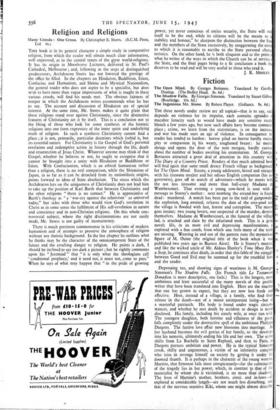Religion and Religions
THIS book is in its general character a simple study in comparative religion, from which the reader will obtain much clear information, well expressed, as to the central tenets of the great world-religions. It has its origin in Moorhouse Lectures, delivered in St. Paul's Cathedral, Melbourne ; and, following in the steps of distinguished predecessors, Archdeacon Storrs has not lowered the prestige of the office he filled. In the chapters on Hinduism, Buddhism, Islam, Confucius and Humanism, and Shinto and Mystical Nationalism, the general reader who does not aspire to be a specialist, but does wish to have more than vague impressions of what is taught in these various creeds, will find his needs met. The obvious fairness of temper in which the Archdeacon writes recommends what he has to say. The account and discussion of Hinduism are of special interest. At the same time, Mr. Storrs makes it quite plain that these religions stand over against Christianity, since the distinctive features of Christianity set it by itself. This is a conclusion not to the liking of those who look for some synthesis of the historic religions into one form expressive of the inner spirit and underlying truth of religion. In such a synthesis Christianity cannot find a place ; it is not, primarily, particular doctrines which forbid it, but its essential nature. For Christianity is the Gospel of God's personal revelation and redemptive action in history through the life, death and resurrection of Jesus Christ. Whatever anyone may think of that Gospel, whether he believes or not, he ought to recognise that it cannot be brought into a unity with Hinduism or Buddhism or Islam. With Confucianism, which is an ethical humanism rather than a religion, there is no real comparison, while the Shintoism of Japan, in so far as it can be detached from its natiorialistic origins, points forward to ideas of State absolutism. The stress which the Archdeacon lays on the uniqueness of Christianity does not lead him to take up the position of Karl Barth that between Christianity and the other religions "there is no contact." He is appreciative of Barth's theology as "a 'war-:cry against the relativism' so universal today," but sides with those who would view God's revelation in Christ as in some sense the fulfilment of His self-revelation in nature and conscience and in non-Christian religions. On this whole con- troversial subject, where the right .discriminations are not easily made, Mr. Storrs is not guilty of inconsistency.
There is much pertinent commonsense in his criticisms of modern humanism and of attempts to preserve the atmosphere of religion without any theistic background. In the last chapter he outlines what he thinks may be the character of the omnicompetent State of the future and the resulting danger to religion. He paints .a dark, I should be inclined to say too dark a picture ; but he rightly comments upon his " Jeremiad " that "it is only what the theologians call conditional prophecy,' and it need not, it Must not, come to pass." When he says of what may happen that "in the pride of growing
power, yet never conscious of entire security, the State will e itself to be the end, while its citizens will be the means to stability and honour," he sharpens the distinction between the St and the members of the State excessively, by exaggerating the ex to which it is reasonable to ascribe to the State personal chant teristics. On the other hand, he is both eloquent and to the point what he writes of the ways in which the Church can be of service the State, and the final pages bring to a fit conclusion a book deserves to be read and will be very useful to those who read it.
J. K. MOZLEY.


























 Previous page
Previous page